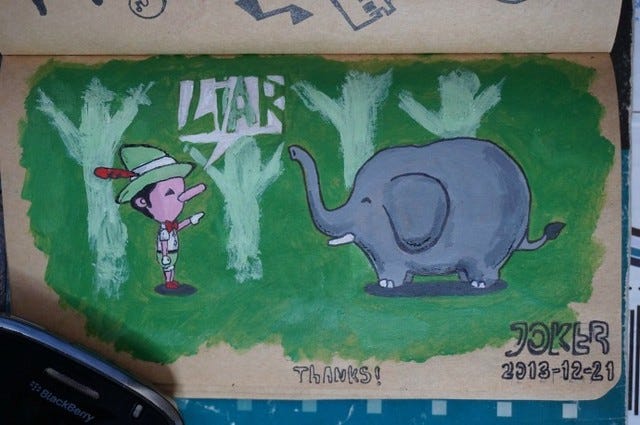
As I mentioned in last week’s Friday Fun Flier, I’ll be offering exclusive content starting in August for $4 a month or $40 a year. Stay tuned for what I’ll be creating!
If you haven’t seen it yet, here’s a survey I made where you can weigh in on The Well-Lived Life’s future! I’d love to hear from you :)
Without further ado, here’s today’s piece!
Think about it: a lie has no power whatsoever by its mere utterance. Its power emerges when someone else agrees to believe the lie.”
I love a good con, and The Hungarian Circle is one of the best.
This was a gang of bank fraudsters led by a Hungarian named Henry Oberlander in the mid to late 20th century. Their forging network was so vast and effective that when they were caught, the prosecution in their trial stated that they “could have wrecked the entire banking system of the Western World.”History has forgotten about them, but they carry a very important lesson for those of us who want to avoid being scammed.
The lesson I learned from a young age
I’ve written before about my parents’ relentless financial skepticism. When their money is on the line, these people become bloodhounds.
They go to timeshare presentations on vacation in Mexico just to get free stuff. When they walk into the room, they tell the salesperson “look, we’re not buying jack, Jack. We’re here for the free ATV tour of the ocean floor. We’ll sit here until we get that, but we don’t need the spiel.”
So the salesperson launches into the spiel. And my parents sit there, bored at first until they start getting cranky (because their time is being wasted) and decide to help the people around them avoid financial ruin.
My Mom whips out a pen and does the math. She shows the whole room that the timeshare contract is printed with snake-oil ink, and that a timeshare is never an asset. Then they sit in the splintered ruin of the presentation until the allotted time is up and they get their free tickets.
How lucky was I to grow up with these people as my parents?
How Henry Oberlander took advantage of banks
Working out of a first-floor apartment in West London, Oberlander and his crew printed up counterfeit bank drafts. These were slips of paper showing money drawn from one bank that was payable to another. At this time, watermarked paper was easy to get, and signatures were easy to fake.
Two of Oberlander’s cronies would cash the forged drafts, roping both banks into a false transfer. They targeted more than 40 banks internationally, never withdrawing more than $20,000 to avoid raising alarm.
Here’s the crazy part: not one of the banks ever reported losing any money. None of them came forward until after Oberlander and his gang were apprehended. None of them ever divulged how much they had lost.
How lies work
In her TED talk, How To Spot a Liar, Pamela Meyer explains to us that lying is a collaborative act. Every lie includes at least two people. A liar lying in a closed room has no power. There is always a lie-ee. Someone has to believe the lie for it to matter.
Here’s what my parents taught me: when money is involved, no one who doesn’t know you is out to do you a favor. Every person/corporation who is selling something that you don’t already have a personal relationship with cares about you to the degree that you have a wallet and will repeatedly use that wallet to give them money. That’s it.
Advertising is built on the lie that there’s more than that. We believe it because we want to believe it. We want to believe that the truck company just wants us to go out and have fun four-wheeling, not lock us into paying exorbitant fees every month for years on end. We want to believe that pharmaceutical companies want to help us live better lives, not addict us to pills so that we become captive repeat customers.
When it comes to being the victim of a lie, our pressure points are the things that we want to believe.
Henry Oberlander understood this perfectly
Oberlander and his gang weren’t apprehended because banks reported losses or fraud. The banks had too much invested in believing that bank drafts were safe because the profits from the sale of bank drafts were high, and they needed people to trust them, so they kept it all quiet and ate the costs.
The Hungarian Circle were caught because they got cocky and careless, like most conmen who get caught. A bookie who had dealings with Oberlander caught the attention of police when he started spending exorbitant amounts of money, and the police put their apartment under surveillance. Their forger started getting sloppy, putting the wrong watermarks and signatures on the drafts. They ran the same con for years until police happened to stumble on what they were doing.
Police closed in on them in August of 1976. When caught, it was challenging for police to figure out Oberlander’s real name, as he had more than 30 passports in various aliases stashed in the apartment. How much do you love this guy? (Sorry, I have a soft spot for conmen, especially if they make the police look foolish for years on end).
By this point, they had taken more than forty banks for what was estimated to be hundreds of millions of dollars. No one knows the real total, because the banks never divulged their true losses.
Oberlander gave an interview years later (after serving three years of his fourteen-year prison term and being extradited to the U.S.), in which he laid out why he was able to run the same con in different countries for almost twenty years:
“Everyone is willing to give something for whatever it is they desire the most.”
You’ve got to understand your own pressure points
I’ll be honest with you guys: while I received a great financial education from my parents, I am terrible when it comes to love. I realized this last year when I sat down and wrote out a list of everyone I’ve ever dated seriously, looking for patterns.
Every person I’ve ever been in a relationship with has come from a broken home. All of them. There is something about instability that I’m subconsciously attracted to. I could speculate about why for days, but that’s my weak point. I want to believe that I can love the instability out of people, and as a result, keep having unstable relationships.
What I want most is to be loved, but I keep falling for the wrong people. I keep believing the lie I want to hear the most.
Lie avoidance is a paradox
It sounds counterintuitive, but to avoid being lied to or scammed, you need self-honesty. You have to know what you want to believe about the world, and how that measures up to what’s actually true.
Whether it’s that Nigerian Princes really do ask people to help move and store large shipments of gold, or that that racist politician really does care about individual blue-collar workers like you, or that your favorite retailer marks things down to 50% off because they care about you, what you want to believe can hurt you.












Share this post